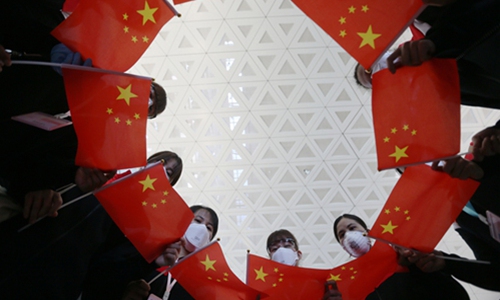Why did China's lockdown work? The difference is state capacity
Source:Global Times Published: 2020/4/23 18:08:40

Members of the medical team from South China's Hainan Province pose at the Wuhan Tianhe International Airport before leaving. Photo: Cui Meng/GT
US political scientist Francis Fukuyama said in a recent interview with Le Point that some countries have great national strength and an effective health policy, while other countries have weak national strength and poor health policies, such as the Indian subcontinent and Africa, and they may be prone to disaster.The strength of a country can be measured by a government's executive powers, mobilization ability and people's willingness to cooperate. Thanks to the strong mobilization powers of the Chinese system, China has great advantages in dealing with the COVID-19 epidemic. Our top-down, systematic and comprehensive governance system has provided us with great ability to handle crises such as COVID-19.
China's mobilization power is also reflected in the due diligence provided by grassroots government staff and Chinese people's cooperation to self-quarantine. These are characteristics of the Chinese model. China's national strength and governance capacity is in its detailed setup. The West's simple description of an authoritarian system is narrow-minded and simply doesn't apply.
China's COVID-19 fight also shows the inherent cooperation and consensus of the Chinese people. People in Wuhan were very cooperative and made a huge sacrifice during the city's lockdown. This is obvious to the world.
It's a sharp contrast to see that in some Western countries, there are people who refuse to cooperate and even organize protests against their government's stay-at-home orders and still reject wearing masks. It seems absurd that even while the epidemic has yet to reach its peak, people would hold up sign and shout slogans such as "End the shutdown" and "Give me liberty or give me COVID-19."
This reveals deep differences between Eastern and Western governance systems and cultures. Western culture has always advocated individualism and emphasized the protection of individual rights and interests. The modern Western society established its liberal system on the basis of individualism. Such a system is indeed beneficial to the steady development of society, but it lacks overall coordination ability compared with some Eastern societies. The rights of individuals should be considered within the context of the entire social environment. Individual interests can be better guaranteed only when the rights of the whole society are protected.
Chinese people willingly cooperated with government control measures during the COVID-19 epidemic. This is more conducive to joint prevention and control in the COVID-19 fight as individuals, society and government can more effectively coordinate a planned response. Western society's deficiencies in this regard have led to serious consequences during the fight to contain the virus.
China's rapid development has seen its national strength greatly improve since the reform and opening-up began in 1978. China has quickly integrated into the world after the country joined the World Trade Organization in 2001, benefiting from modern international political and economic order. Its vast territory and large population have given China a good foundation for establishing a competitive production system. Facts also prove that China has one of the strongest industrial production capacities worldwide.
During the pandemic, the world needs countries that can quickly produce needed medical materials to support the COVID-19 fight. China has a strong advantage in this area. The production of medical products requires huge resources and great human resources, which Western countries lack.
During the COVID-19 pandemic, China's system and production capacity advantages guaranteed our quick control of the virus, and manifest our national strength.
The article was compiled by Global Times reporter Li Qingqing based on an interview with Su Hao, founding director of the Center for Strategic and Peace Studies at the China Foreign Affairs University. liqingqing@globaltimes.com.cn
RELATED ARTICLES:
Posted in: VIEWPOINT